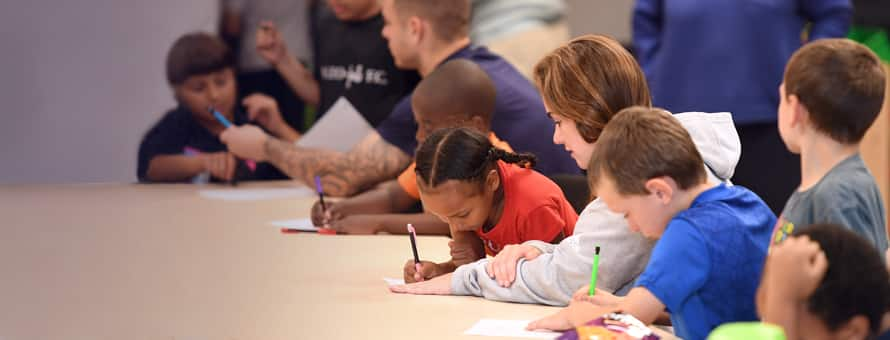
At Southern New Hampshire University (SNHU), we envision a world where people – regardless of life conditions – can pursue pathways that unlocks greater opportunity, social capital and upward mobility.
Our Commitments
- Providing education access to underserved, marginalized and nontraditional learners
- Being an employer of choice for a diverse national and global workforce
- Creating a culture in which human difference is valued and innovation is ongoing
- Supporting like-minded organizations, nonprofits and charitable groups
Work In Progress
Our efforts are constantly in motion, but we’re proud to share what we’ve accomplished this far.
42,000+ Global Days of Service Hours
Finished by staff, students and alumni since 2016
90+ Charities Supported
Across the globe, from the United States to Eastern Africa
3,000 Tons of Avoided CO2 Emissions
Through strategic energy management practices in 2022
36,000+ Paid Volunteer Hours
Completed by full-time SNHU employees since 2016
A Collaborative Endeavor
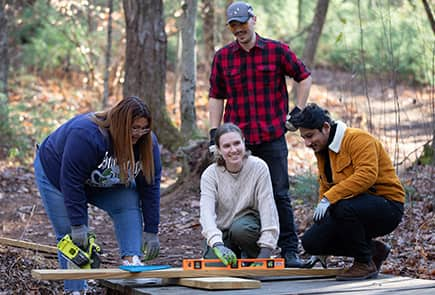
Sustainability Initiatives
In unison with a multitude of sustainability initiatives, SNHU is committed to creating a far-reaching, positive impact throughout our global community. We empower students and employees to advance a sustainable organization and culture by convening stakeholders, measuring our work, and sharing knowledge and successes.
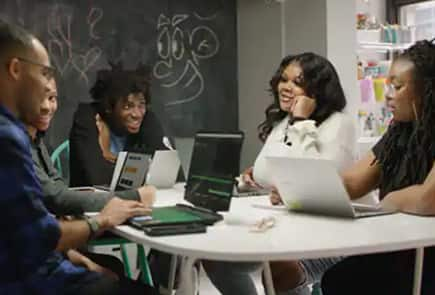
Community Partnerships
Through partnerships with community-based organizations, SNHU’s Community Partners program aims to expand college access, drive degree completion rates and build workforce relevant skills among learners who have traditionally faced education barriers. For more information, contact communitypartners@snhu.edu.
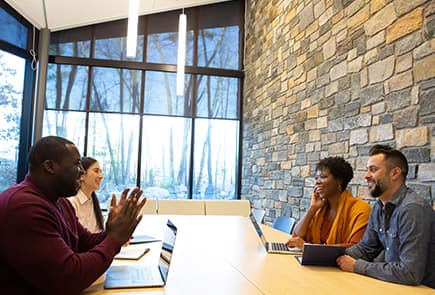
The Office of Diversity & Inclusion
The Office of Diversity and Inclusion serves as lead strategist and thought partner on all university equity, diversity and inclusion matters and supports the SNHU community to expand access to higher education so that anyone, from anywhere, can achieve their goals. They instill the values of restorative practice and intercultural competency development to drive toward equal opportunities for students and employees alike. For more information, contact odi@snhu.edu.

The SNHU Center for New Americans
The SNHU Center for New Americans opened in 2017 to serve the educational needs of new American families in Manchester, New Hampshire. The program’s foundation is a safe space that welcomes anyone who enters, no matter their path to get there.
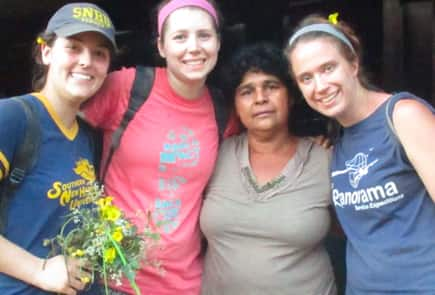
The Chandler Center
Since its formation in 2005, The Chandler Center's fundamental purpose has been to empower students to be civically engaged citizens who are committed to social action. Student leadership is at the core of its management, coordinating services and leadership opportunities that allow fellow scholars to be active members of society.
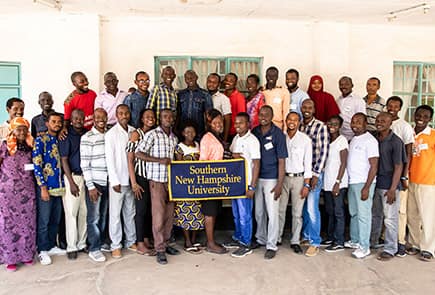
Global Education Movement (GEM)
The Global Education Movement (GEM) is a major SNHU initiative offering university degrees to refugees around the world. Created in 2017, GEM is the first large-scale online learning initiative for refugees, partnering with in-country organizations to deliver high-quality, low-cost education tailored to meet the needs of displaced learners.
SNHU and Boston Celtics Technology Lab Partnership
From 2015 to 2021, Southern New Hampshire University (SNHU) partnered with the Boston Celtics to create and unveil a series of state-of-the-art technology labs in schools across Massachusetts and New Hampshire. This collaboration was designed to empower students with current technological tools and foster interest in STEAM (science, technology, engineering, arts and mathematics) education through immersive, hands-on learning environments.
The initiative began with the first lab at Cheshire Elementary School in Cheshire, MA. That lab, and those to come, were created as Celtics-themed learning hubs outfitted with Chromebooks or iPads, printers, smart TVs and other high-tech tools tailored to the needs of each school. SNHU and the Celtics also invested in new furniture, decor and equipment to provide engaging environments to inspire creativity and exploration.
Over the course of the partnership, 14 technology labs were launched, with each opening including visits from Celtics players, alumni and mascot "Lucky" the Leprechaun, who joined students for coding exercises, tech demos and pep rallies. Schools not only received technology, but also had guidance on integrating the tools into the curriculum for long-term impact.
SNHU students also contributed to the initiative. In one case, an SNHU graphic design student developed custom wall art for a lab, blending education and team spirit in visual form.
Although the formal partnership concluded in 2021, its legacy continues in the classrooms and lives of the students it served. Thousands of young learners gain early exposure to digital skills and innovation tools.
Related Articles

15 Years Later: A Surprise Reunion for Two Grads at Commencement

How Celebrating Small Wins Can Make a Big Difference


